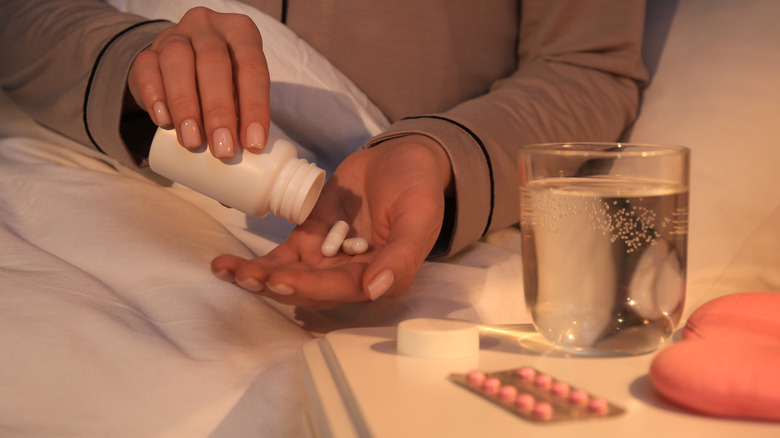Avoid This Melatonin Mistake If You're 50 And Older
Melatonin can be your best friend to help you change your sleep schedule. Your pineal gland already secretes melatonin on its own when your eyes sense fading sunlight levels. That sets into motion for your body to shut down and prepare for a restorative sleep. When you're jet-lagged, work night shifts, or need to get to bed a little earlier, melatonin supplements can help to get your sleep cycle started.
As you age, your body secretes less melatonin due to the wearing of the pineal gland or cataracts blocking some of the natural light. According to a 2020 article in Missouri Medicine, reduced levels of hormones such as melatonin make it harder to regulate your circadian rhythms, so you might find it harder to maintain a deep, restorative sleep each night. Even if you've been a great sleeper all your life, you might be tempted to take melatonin to help you get better sleep. Although melatonin is generally safe for most people, melatonin can interact with medications that are commonly prescribed for older adults.
Which medications might interact with melatonin?
Your liver does the job of metabolizing most of the medications you might take. It produces certain enzymes that get the drug to work in your body. These enzymes can get overworked if there's too high a quantity in the body at once and subsequently affect how effective the drug can be.
According to a 2022 review in Clinical Interventions in Aging, melatonin uses some of the same enzymes that your medications use. Selective serotonin reuptake inhibitors (SSRIs) like fluvoxamine and citalopram can naturally raise melatonin levels in the blood. While this might be a good thing, taking additional melatonin can increase side effects such as drowsiness. Older adults who take antidepressants like quetiapine, escitalopram, and fluoxetine might experience impaired thinking and motor skills if they also take melatonin, according to Drugs.com.
Antidepressants might boost melatonin levels, but taking melatonin can interfere with some drugs that treat high blood pressure and blood clots. Taking melatonin alone might slightly reduce your blood pressure, but people taking the calcium channel blocker nifedipine saw their blood pressure increase while taking 5 milligrams of melatonin. People taking the anticoagulant warfarin might see an increase in bleeding while taking melatonin. You should check with your doctor to see if taking melatonin may interfere with your current medications.
Supplements to help with sleep if you can't take melatonin
Remember that melatonin technically isn't a sleep aid. Other supplements might help you relax so that you can fall asleep or fall back to sleep. Consumer Reports says up to 80% of people over 70 don't get enough magnesium in their diet. Magnesium is important for your bone, heart, and nerve health, but it also might help you sleep, according to a 2021 meta-analysis in BMJ Complementary Medicines and Therapies. Compared to placebos, magnesium helped older adults get to sleep an average of 17 minutes faster and sleep 16 minutes longer. Be careful not to take too much magnesium because it can make you poop.
You could also try pairing gamma-aminobutyric acid (GABA) with l-theanine in a supplement. GABA is a sleep-friendly neurotransmitter, and l-theanine is an amino acid found in green and black tea. Even though each substance alone could improve sleep, a 2019 study in Pharmaceutical Biology found that taking GABA and l-theanine together might help you get to sleep faster and sleep longer while also increasing REM sleep. However, this study was conducted on animals, so more research is needed.


